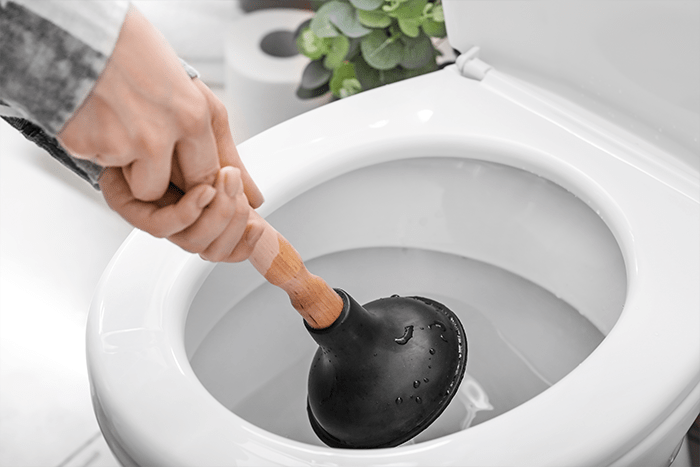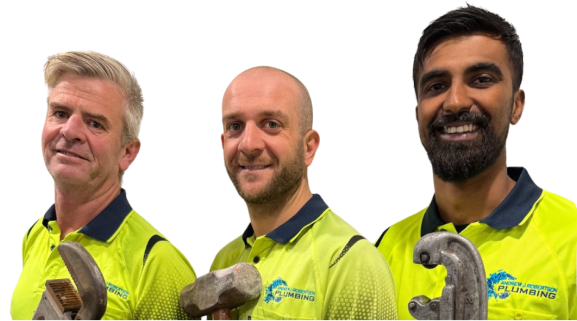
A broken toilet can really ruin your day – especially if you don’t know how to unblock it. Toilets can become blocked for a number of reasons, but we tend to not think about it until it happens. In some cases, it may be necessary to call in a professional to look at the problem, but with more minor issues, you may be able to sort it out yourself with minimal fuss and cost. Here, we will have a look at how you can unblock a toilet yourself, what you will need on hand, and when it really is time to reach out to a qualified plumber to get your toilet flushing once more.
The first thing that you need to think about when looking at a blocked toilet is what exactly is causing the blockage. You usually won’t have to think very far to understand what is creating the problem. Often the toilet will be clogged with a large amount of toilet paper, or having foreign objects dropped into the bowl. These can include wet wipes or makeup remover wipes, thicker tissues, sanitary products, cotton wool, or anything that is not toilet paper. Toilet paper is the only thing that should ever go down your toilet, but mistakes do happen. Of course, if you cannot easily recall or work out what the blockage is, it may be a different issue altogether, such as issues with the sewage system itself, or blocked drains in your local area.
To begin with, test your toilet – but not too much. If you flush your toilet and find it blocked, do not continue to flush it in hopes that the blockage will clear by itself. If you continue flushing, the toilet is likely to overflow and then you will be looking at water damage, as well as a very unhygienic situation. However, even without this happening, you should consider the possibility of water splashing out of your toilet – so make sure you protect your floor and can stem any flooding by putting down towels or newspapers.
You will also need to think about wearing rubber gloves so that your skin does not come in contact with toilet water. Other tools you may need include plungers, drain cleaners (either purchased or made at home), augers (otherwise known as toilet snakes) – you may even wish to use a wet/dry vacuum in some cases. Working out what kind of blockage you have will help you to decide what you need to use, and each method should be carried out very carefully to prevent damage to your drains, pipes, and the porcelain of your toilet.
In all likelihood, you will have attempted to unblock a toilet with a plunger before. Though not the only method, this is often the most popular and most homes have a plunger handy. The common issue of toilet paper buildup is best dealt with by using a plunger, but make sure you have the right kind. A flange plunger or a ball plunger is the best bet, rather than the cup version you may have for your sink.
In order to use your plunger properly, warm the rubber with hot water and push it against the toilet’s hole, pumping it gently until the blockage is dislodged. Once this has happened, you can flush your toilet again to test if it has worked sufficiently.
There are many different kinds of solutions you can use to try and clear your toilet – enzyme solutions and drain cleaning chemicals being the main two that you can buy. However, you may wish to make a solution from natural products such as baking soda and vinegar.
Enzyme products are considered the best choice, as they can break down solid masses. They are less dangerous to use than chemical drain cleaners, and simple to use when the instructions found on the packaging are followed.
A homemade option is also a great choice, especially for those looking for a more natural option. Mix a cup of baking soda with two cups of vinegar and two litres of hot water, pouring the water into your toilet bowl first and follow with the baking soda and vinegar. You can leave this overnight without worrying about damage occurring, and it may break down the blockage, however, will not work with non-organic blockages.
An auger, or a plumbing/toilet snake, is a rod made of flexible material which can be fed down into the toilet drain. You should ensure that you are using one that has been specially designed for a toilet rather than a sink. It is best used for solid blockages that cannot be removed by other means. However, bear in mind that a plumbing snake can scratch your pipes easily, and if a blockage is this significant, it might be time to call a plumber. If you are using an auger, though, you simply feed it down into the drain until you locate the blockage with the head of the auger, then twist the auger to break up the blockage. Once this is done, withdraw the snake and flush the toilet.
If you have a wet/dry vacuum, you may be able to use it to unblock a toilet. While this should never be your first option, as it involves pulling the blockage from the toilet rather than breaking it up or pushing it through. You will need to pull all the water from the bowl using the vacuum and push the towel-wrapped hose into the drain hole slightly. This should help to create a seal that can provide the best suction – but there is no surefire way of knowing that the clog will be sucked up, and this can be quite a messy and unpleasant way of clearing a toilet.
While all of these methods are valid and you can definitely give them a try, sometimes the blockage is just too big for a DIY job. If you do not want to try them for fear of damaging your toilet or pipes, or you have attempted them and they haven’t worked, you can call a professional plumber to give you a helping hand. At Andrew J Robertson Plumbing, we can help with everything from diagnosing issues to dealing with them, and even ensuring that your plumbing is being properly maintained. Get in touch with us to discover our full range of services and to find how we can support you – whether you have a blocked toilet or something a little trickier to deal with, we can help to get your plumbing back to its best.

Professional local plumbers you can trust. Call us for your domestic plumbing needs and you will not be disappointed.
Andrew J. Robertson Plumbing

Are you looking for a reliable professional for your plumbing needs?
Simply fill in the form below,
or call 0422 101 331.
"*" indicates required fields
Fill in this short form (takes 61 seconds) and we’ll contact you shortly.